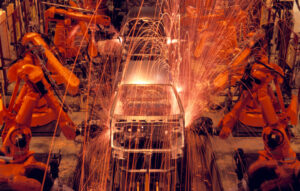They have a proud history. They run out-of-date business models. They are uncomfortable with the digital world. And they are getting older. Elements of the mainstream media and some of Europe’s largest countries have a lot in common. They find themselves disorientated in a century that is not going their way. And there is another thing they have in common. They blame Donald Trump.
I am familiar with both of these legacy creatures, having written about European affairs across various news outlets since the mid-Eighties. The story of the EU, in particular, has been that of a roller-coaster, currently on a prolonged downhill stretch. I will be following its uncertain trajectory in my new weekly column for UnHerd.
It is typical that the most important political event for Europe this month is Trump’s inauguration. Trump is not the specific cause of anything that has gone wrong; but he is the one who is bound to expose Europe’s weaknesses — and this is why he is feared.
He is feared among other things, for his trade policy, which could end up inflicting significant economic pain. He might impose a blanket tariff on industrial goods, as he proposed during his election campaign. Or he could target China and Germany specifically. Or he might try to cut deals. But one way or another, he will be trying to shore up America against Chinese and German export surpluses. The Biden administration’s Inflation Reduction Act already prompted European industrial companies to relocate some of their production to the US. Tariffs could have the same effect: they could trigger the next stage of Europe’s industrial decline. Trump is famously hard to predict, but this is a very real scenario.
We do know, however, that he does not care much for the transatlantic relationship; it no longer has the same strategic significance for the US that it once had. And so a more imminent threat for Europe would be his response to the Ukraine war. Economically, there is no way the Europeans can stem their support for Zelenskyy without the help of the US. Germany’s Chancellor, Olaf Scholz has admitted outright he is not prepared to sacrifice welfare spending to fund more arms for Ukraine and as he fights an election campaign, he is rejecting trade-offs between social and defence policies. Three years ago, it was a different story when he declared a Zeitenwende — a change of epoch. But as it turned out, that change was dependent on the price being right.
Other European leaders may be more diplomatic than Scholz, but they face the same political and economic constraints. Take Emmanuel Macron. The French president is rhetorically in a different league from Scholz, but his country’s resources are similarly stretched — France can’t deploy any meaningful military or financial support. Given that Russia has, for some time now, had the upper hand in the war, it would take a big financial sacrifice by all EU countries, and by Trump, to turn things around. I don’t see this happening.
Far more likely is Trump trying to impose a peace deal on Ukraine. But this would expose Europe’s hypocrisy and weakness as it struggles to deliver on its promises: security guarantees after the war ends; funding for Ukraine’s reconstruction; and paving the way for future EU membership. The probable scenario is one in which Ukraine, like Turkey before, gets stuck in the EU’s ante-chamber where the only exit is the door through which it came. I would not want to speculate on what conclusions Ukrainian voters might draw once they realise this deeper truth about western Europe — that it has become a place of big words and unfulfilled promises.
It is perhaps telling that Scholz and Macron have chosen this very moment to throw their countries into political crises. Macron’s reckless gamble to call snap parliamentary elections last summer trapped France in a state of political gridlock from which it is struggling to recover. The President has a divided parliament that ousted Michel Barnier when he presented a budget that would have taken a serious first step towards bringing the fiscal deficit under control. Alas, the new prime minister, François Bayrou, does not appear to have much of an economic policy. Macron himself never cared much about the budget because economic growth always took care of the deficits. But this is no longer the case and right now, French politics is denying its fiscal arithmetic. Even a sovereign debt crisis, which is a possible scenario, may not be enough to focus minds.
Over in Germany, Scholz triggered a political crisis on the very day of Trump’s election when he ended the coalition over a petty financial squabble with Christian Lindner, his finance minister. Germany has a lower debt ratio than France, but its economic problems are more serious. Its industrial decline has been going on for longer, and its export-based economic model is no longer working. This is not just about Russian gas or nuclear power; this is a story of a country that has failed to invest and innovate over the past decade, and one which has relied too much on too few industries. Germany’s economic model depends on persistent current account surpluses, but China is now a significant rival, and the US, under Trump, can no longer be relied upon to act as a willing absorber of those surpluses. As Germany goes to the polls in February, I struggle to identify even one politician who is focused on any of these issues.
All of this is playing out against a worrying backdrop. Europe’s real friends are those who speak truth to power, who encourage change and reform, rather than flatter the status quo. But the EU has chosen to listen to the wrong voices — and identity politics has taken hold. According to the now dominant narrative in political circles, the EU is under attack by populists and fascists. And so, the Romanian constitutional court’s decision to annul a presidential election is applauded because voters were unduly influenced by Russia through TikTok — or as they might put it, the wrong guy won. Now they accuse Elon Musk of trying to do the same in Germany after he supported the Alternative for Germany party.
How is Europe so diminished? I remember a much more confident bloc in the late Eighties and early Nineties. The euro, introduced in 1999, was the high watermark of European integration. I even wondered at the time whether it could replace the dollar as the leading global currency. The EU’s enlargement to central and eastern Europe five years later was another supposed political triumph. But then came the backlash. The subsequent rejection of the European constitutional treaty by France and the Netherlands in 2005 ended dreams of the EU developing into a federal state, and the global financial crisis exposed the weakness of the European banking system. The eurozone sovereign debt crisis, meanwhile, brought out the worst in everybody. Two German politicians even suggested that Greece sell an island or two to pay for the debt. Further insults followed. The EU failed to solve the crisis at a political level and a central bank bailout was necessary. This, for me, was the moment the European integration dream died.
Perhaps none of this would have mattered so much if its underlying economy were more resilient. But growth no longer seems to be a political priority. Instead, the EU’s focus over the past five years has been on the Green Agenda which massively raises compliance costs for companies, on Ukraine, and on laws for data protection and social media, designed to keep the EU in the digital dark ages for a little while longer.
Meanwhile, as it looks in the wrong direction, Europe’s business models are crashing. This is most evident in Germany, but there are warning signs in the UK and France, too. The UK used to be the EU’s financial centre and a leading exporter of services — a model that worked well until the global financial crisis. It was this, not Brexit, that delivered a death blow to the UK’s productivity growth from which it has yet to recover. Of course, European countries all had different models, and they all broke for different reasons. But what all the nations all have in common is their inability to reinvent themselves. No wonder their once great project is on the brink of collapse.
This is where we find ourselves today, facing an uncertain, potentially chaotic future. This column will attempt to make sense of a world that is becoming less euro-centric, less multilateral, and more digital. And it will look at a Europe that has turned itself into a place of political instability, economic weakness, and technological decline — the geopolitical equivalent of Norma Desmond. Like Norma, it was big once. But like a shunned diva, it won’t go quietly.
Disclaimer
Some of the posts we share are controversial and we do not necessarily agree with them in the whole extend. Sometimes we agree with the content or part of it but we do not agree with the narration or language. Nevertheless we find them somehow interesting, valuable and/or informative or we share them, because we strongly believe in freedom of speech, free press and journalism. We strongly encourage you to have a critical approach to all the content, do your own research and analysis to build your own opinion.
We would be glad to have your feedback.
Source: UnHerd Read the original article here: https://unherd.com/



